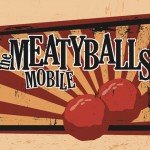On August 30, 2011, the Institute for Justice Clinic on Entrepreneurship held a meeting at the University of Chicago Law School called the “My Streets! My Eats! Strategy Meeting.” There were roughly 50 people in attendance, including: Matt Maroni (author of the legislation to let food trucks cook on board, among other things, Christian (chef de cuisine of Maroni’s gaztro-wagon), Joaquin (owner of Brown Bag Lunch Truck), ChicagoFoodCarts.com, as well as a host of aspiring food truck owners and 13 food cart operaters from Little Village along with their representative and translator from Asociación de Vendedores Ambulantes. Plus, I (Alex) was there to listen and join in conversation more from the perspective of the consumer.
I am not going to give you a synopsis of the entire meeting (you’re welcome), but instead I’ll provide you with some things that surprised me the most or that really resonated with me. If you want the full scoop, you’re moooooore than welcome to check out the PowerPoint with all the nitty-gritty (embedded at the bottom of this post).
- Current legislation impedes upon our rights as consumers Food trucks must maintain a 200-foot buffer from any restaurant in order to not divert foot traffic from the restaurant. That means that the government is funneling you, the consumer, to the restaurant by essentially hiding the food truck from plain sight. That’s similar to that hidden box with the mushroom in the old school version of Super Mario Brothers. If you know where that invisible box is and jump into it, you can eat the mushroom in it. But, you only know it’s there if you are really, really in the loop; the standard player (or consumer) doesn’t know about it because there are ulterior motives for hiding it.
- The biggest enemy to food trucks is…wait for it… restaurants (especially those of the chain variety). While some restaurant owners (like Rick Bayless and Stephanie Izard) have demonstrated their support for food trucks, there are many who have gone out of their way to squash food trucks. The big chains have the resources ($) to really lawyer up and fight against Chicago’s food truck movement, which we find funny because those are the restaurants that most food truck freaks wouldn’t want to dine at given the choice; their menus simply are lackluster to most of our community. Most of us prefer a Xoco to a Qdoba any day.
- Food truck laws are not actively enforced; they’re only implemented when someone (refer to the aforementioned point) feels like asking them to be enforced. While it would suck if the city enforced all the rules (i.e. trucks aren’t supposed to play music or be in any one spot for 2+ hours), at least trucks wouldn’t have to live in fear. All the legal grey area may also explain why the police have been hassling trucks and attempting to shut them down without issuing tickets.
- The current legislation is structured to give preferential treatment to one business model over the other, which is not the government’s role to do.
- The law that sucks for food trucks but actually threatens the livelihood of food cart owners is the dictation of hours of operation. Food cart owners (at least the ones in the room) make their money serving breakfast and bagged lunches to workers starting at 3 a.m. and winding down around 9:30 a.m.. Existing legislation prevents carts (and trucks) from serving before 10 a.m..
- There is a huge amount of indecision and ambiguity in the law, which keeps the government chasing their own tales and food cart & truck owners alike always sleeping with one eye open. Changing legislation would mean more efficient government (at least in this respect), and both trucks and restaurants could operate effectively at full throttle on a fair playing field.
To download the My Streets! My Eats! presentation, click the SlideShare presentation embedded here. Note: it also outlines the current legislation, so if you are thinking of starting a food truck but wondering what the laws are regarding that and what you have to go through to make that happen legally (in plain English), this is an excellent resource.




Connect with Us